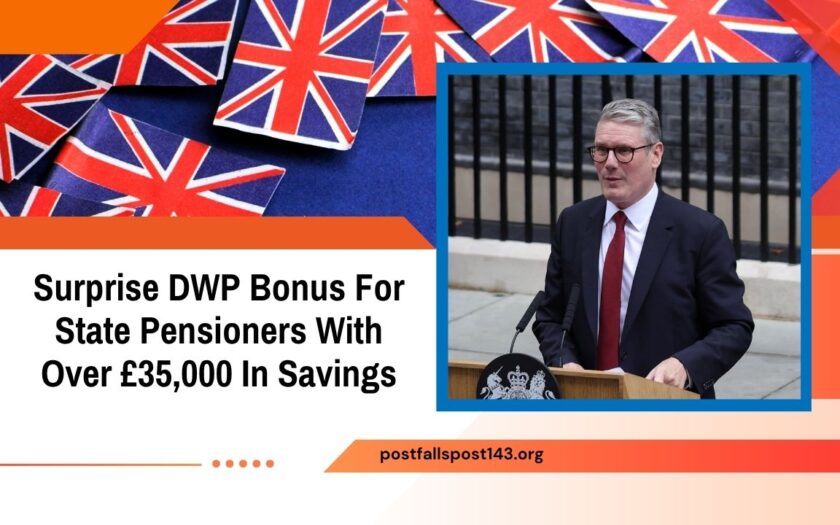The Department for Work and Pensions (DWP) has surprised many pensioners across the UK by confirming that those with over £35,000 in savings can still qualify for the Winter Fuel Payment – a £300 tax-free bonus to help cover heating costs during colder months.
This comes after the Labour government updated eligibility criteria in June 2025, expanding access to nearly nine million older citizens.
If you’re a state pensioner born before 25 September 1959, you may still be entitled to this support—even if your savings exceed the previous assumptions. The key lies in understanding how taxable income, not total savings, affects eligibility.
DWP Updates Eligibility Rules in 2025
In response to backlash over previous exclusions, the DWP revised the eligibility criteria for Winter Fuel Payment to focus on taxable income, not the amount of money saved. This marks a significant policy shift and opens the door for pensioners who were previously disqualified due to savings thresholds.
The new criteria clarify that interest earned from savings outside tax-free accounts like ISAs can affect your eligibility.
With interest rates remaining relatively high in 2025, many pensioners have unknowingly pushed themselves above the income threshold due to the taxable interest they earn on their accounts.
Key Criteria for Winter Fuel Payment Eligibility
| Criteria | Details |
|---|---|
| Age Requirement | Born on or before 25 September 1959 |
| Savings Threshold | No hard limit, but taxable interest on savings affects income levels |
| Benefit Amount | £250 to £600 (including extra £300 cost-of-living top-up) |
| Taxable Income Consideration | Interest from non-ISA savings counts; ISA earnings do not count |
| Automatic Payment | Usually paid automatically if receiving State Pension or certain benefits |
| Payment Window | Between November 2025 and January 2026 |
Why Total Savings Don’t Automatically Disqualify You
Taxable income—not total savings—is the deciding factor for eligibility. If your money is parked in taxable savings accounts, the interest earned adds to your income, which can potentially push you above the benefit income threshold.
Andy Wood, a tax expert, highlighted the value of smart financial planning to protect benefit access. Using strategies like tax-free ISAs can help pensioners reduce their taxable income and retain eligibility for programs like the Winter Fuel Payment.
Use ISAs to Shield Your Eligibility
A major tool to help pensioners stay below the income threshold is the Individual Savings Account (ISA). These accounts allow up to £20,000 in contributions per tax year, and interest earned inside an ISA is not taxed or counted toward income.
This makes ISAs an ideal place to store savings without affecting benefit entitlements. Pensioners with over £35,000 in total savings can shift a portion into an ISA to strategically manage their reportable income.
Should You Defer Your State Pension?
Another method that affects benefit access is the deferral of your State Pension. While deferring offers a 5.8% increase in your future pension payments annually, it may increase your taxable income later, potentially leading to the loss of benefits like Winter Fuel Payment.
For example, deferring could cost you £12,000 in missed pension payments annually, and it may take years to make up that loss, depending on your life expectancy and other sources of income. Strategic timing and tax planning are essential to determine if deferring is right for you.
Smart Planning Tips for Pensioners
- Review taxable vs. non-taxable income to keep it under DWP thresholds.
- Shift taxable savings to ISAs wherever possible.
- Track interest rates, as higher returns can push you over the line unintentionally.
- Get financial advice to understand how pension income, interest, and other earnings interact with benefits.
The Winter Fuel Payment in 2025–2026 is still within reach for pensioners with over £35,000 in savings, provided they strategically manage their taxable income.
By leveraging tools like ISAs and understanding how savings interest affects benefit eligibility, pensioners can continue to receive vital support from the DWP.
These recent changes reflect a more flexible and inclusive approach to benefits. However, the key lies in being informed and proactive.
Whether it’s restructuring your savings or timing your pension withdrawals, a thoughtful strategy could mean the difference between receiving or missing out on your £300 Winter Fuel Payment.
FAQs
I have more than £35,000 in savings. Can I still get the Winter Fuel Payment?
Yes, you can still be eligible. The DWP considers taxable income, not total savings. Interest from taxable accounts could impact this.
How much is the Winter Fuel Payment in 2025?
Eligible pensioners can receive between £250 and £600, which includes a £300 cost-of-living top-up in 2025–2026.
Are ISAs a safe option to protect my benefits?
Yes. ISAs are tax-free, and interest earned from ISAs does not count toward your taxable income for benefit purposes.

